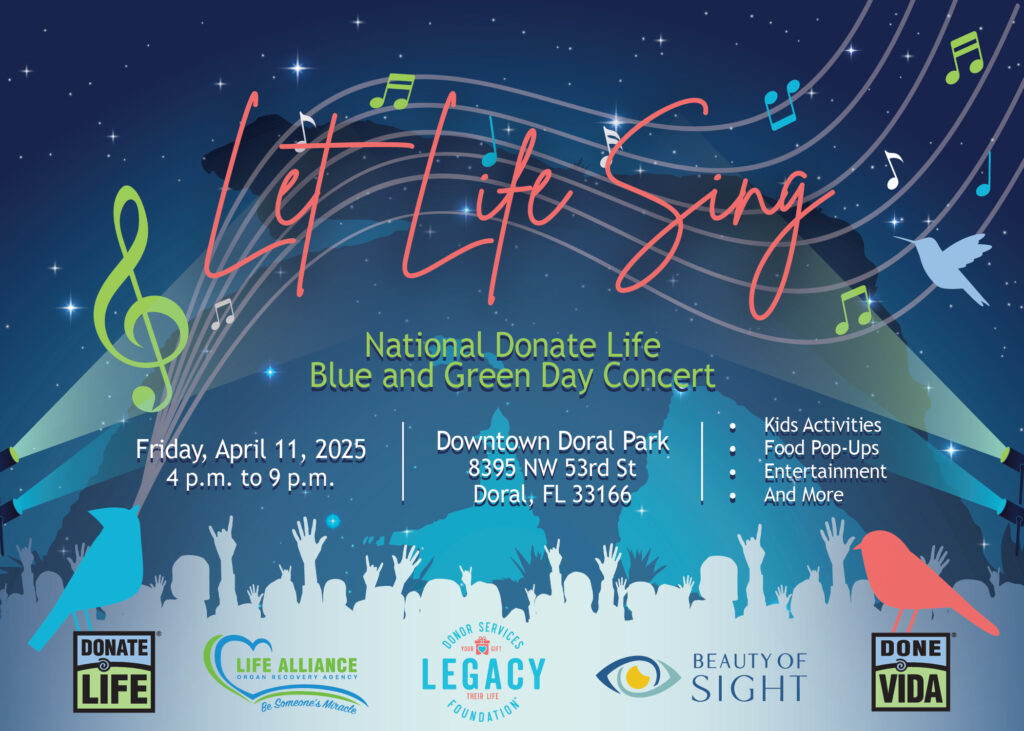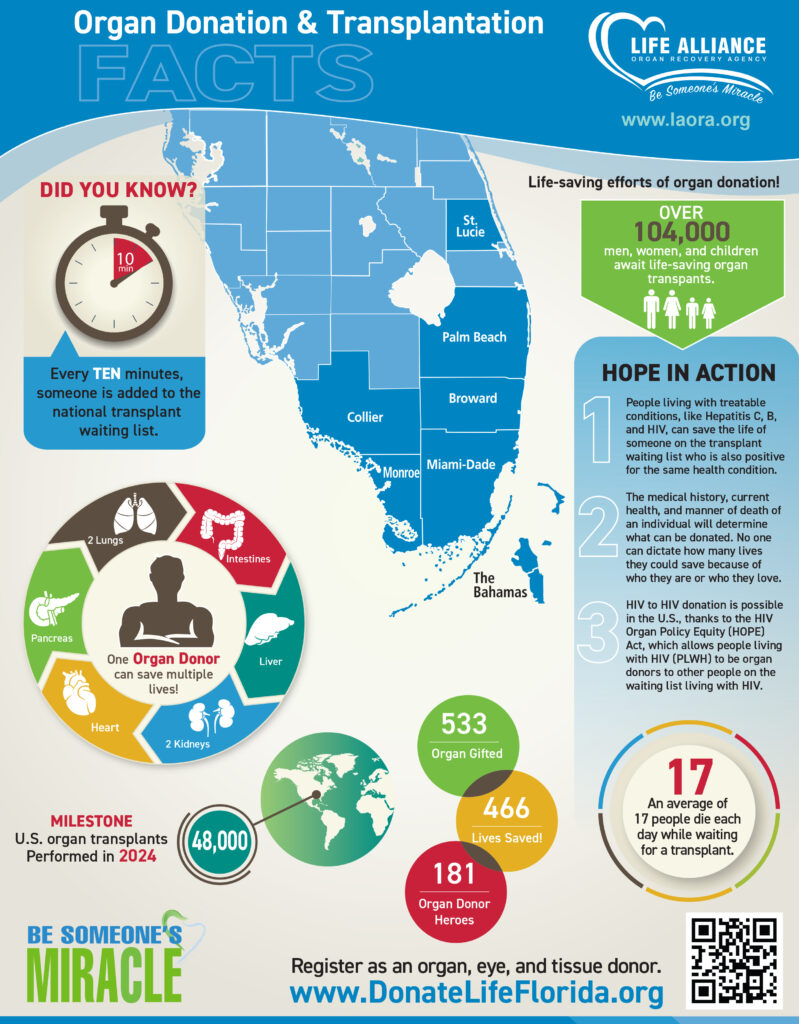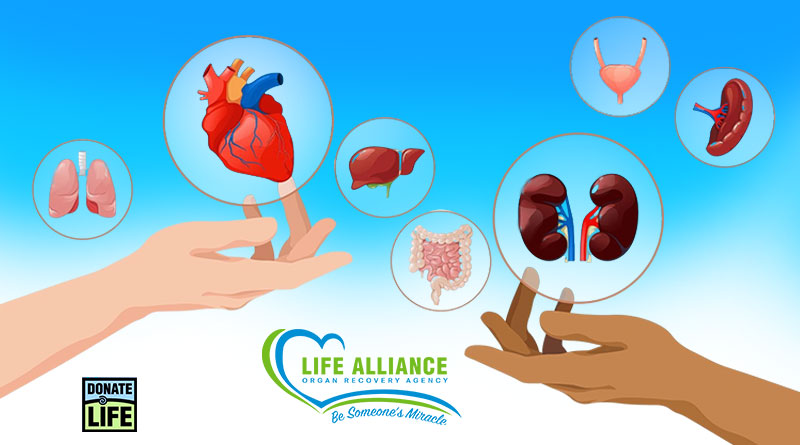Miracles, Hope, and Healing for Transplant Patients and Donors
April is National Donate Life Awareness Month
By Maria Alejandra Pulgar
Two realities coexist when an organ transplant occurs: the hope and joy of the patient that was waiting for a miracle, and the pain and grief of those who lost a family member. Organizations like the Life Alliance Organ Recovery Agency (LAORA) coordinate with respect and compassion the process of turning tragedies into miracles that save lives.
April is National Donate Life Month, a time dedicated to raising awareness about the critical need for organ, eye, and tissue donation. “There are more than 104,000 people in the U.S. waiting for a life-saving organ,” explained George Yacoubian, Brand Specialist for the Organ Procurement Organization (OPO) of LAORA at University of Miami (UM).
“Every day, 17 people die waiting for a transplant, and every 10 minutes, someone is added to the national waiting list.” In Florida alone, over 5,000 people are waiting, with the Hispanic community representing a significant portion of those in need.
LAORA is one of the 56 federally designated organ recovery agencies, covering the needs of Dade, Broward, Monroe, Collier, Palm Beach, and St. Lucie counties, and the Bahamas. The main mission of the organization is to “Provide life-saving organs while caring for the families of organ, eye, and tissue donors.”
 Along with the City of Doral, LAORA has planned the “Let Life Sing National Donate Life Concert” for April 11th, which will be designated “Organ Donation Day” at Doral.
Along with the City of Doral, LAORA has planned the “Let Life Sing National Donate Life Concert” for April 11th, which will be designated “Organ Donation Day” at Doral.
The event will take place at Downtown Doral Park, to bring the community together for this noble cause. There will be live music, activities for children, and City Hall will be illuminated in blue and green in honor of the occasion.
LAORA engages in extensive community outreach, educating schools, colleges, universities, organizations, and government institutions about the importance of registering as an organ donor. Events like the one planned in Doral play a crucial role in raising awareness and encouraging more people to get involved.
The Process of a Miracle
One person has the potential to save up to eight lives by donating organs (lungs, heart, liver, kidneys, pancreas, and intestines) and improve the quality of life for up to 75 people through the donation of eyes, skin, and other tissues.
“Organ donation is only considered after all life-saving efforts have failed,” said Yacoubian. When two independent physicians determine that a patient meets the criteria for donation, hospitals contact LAORA to evaluate the case and communicate with the family about the opportunity to save lives. Only with consent does the process of organ recovery, transport, and transplantation begin—time is of the essence once this occurs.
“The priority of first responders and hospitals is to save lives”; none of them have access to a patient’s donor status. A person may be registered as a donor but choose not to display it on their ID. Therefore, the myth that being registered as a donor puts one at risk of not being saved in an emergency is false.
Organ transplants are performed at transplant centers, which only become involved once the Organ Procurement Organization, like LAORA, has completed the coordination process.
“Organ donation is an altruistic act.” There is no cost for the organs to recipients, nor is there compensation for donor families. The only costs involved are those related to the medical procedures required by the recipient.
This process is charged with intense emotions: the hope of those waiting for a compatible organ and the grief of those who must let go of a loved one. Registering as a donor lifts part of the burden from families, allowing them to honor their loved one’s wishes.
Who Can Be an Organ Donor?
“Everyone has the potential to be an organ, eye, and tissue donor,” said Yacoubian. “There are no age, gender, religious, or ethnic limitations—not even some medical conditions. Donation is a noble act that can save lives, even in the unfortunate event of our passing.”
While some medical conditions require special consideration, they do not automatically disqualify someone from donating. “Even people with diabetes, hepatitis, or HIV can be donors,” Yacoubian clarifies. Doctors evaluate each case individually. In fact, hepatitis or HIV-positive donors can save the lives of patients with the same conditions.
When donation is a possibility, doctors conduct thorough evaluations to determine eligibility, and family consent is essential. Those over 18 can register at www.DonateLifeFlorida.org or at the DMV or Tax Collector’s Office.
For living organ donation, the process differs. Only a kidney or part of the liver can be donated while living. Yacoubian notes that living donors are not registered in the same way as deceased donors. They must undergo a medical evaluation at a transplant center to determine eligibility.
Two birthdays and an extended family
Once the donation is performed, the donor’s family only knows how many people were saved by their loved one through the organs donated, and their demographics.
LAORA offers the option to the families and coordinates the process to establish contact, first with an introductory letter, consent of communication, epistolary contact, and finally a personal introduction. In most cases, the experiences are great, and the relationships that develop become an extended family for all those involved.
Many family members of donors and recipients become volunteers for LAORA, giving the testimony of their experience to encourage people to register as organ donors.
The need for organs far exceeds the availability, and many people die waiting in the list for a compatible organ. There is no age limit or health requirement for becoming a registered donor; medical conditions are evaluated if the moment arises, and then a decision is made. In any case, becoming a registered donor is the ultimate legacy a person can leave.
For an organ donation recipient, there are two birthdays: when they are born and the day they receive their new organ. As one of LAORA recipients said, “We got a miracle when we are born, but having it twice is beyond thought”.
National Donate Life Month serves as a crucial reminder of the power of organ donation to save and transform lives. Organizations like LAORA are working to bridge the gap between those in need and the life-saving gift of donation. As a community, coming together on April 11th at Downtown Doral Park, Doral will take a stand with those who hope to have a new chance in life thanks to the selfless gift of an organ donor.


